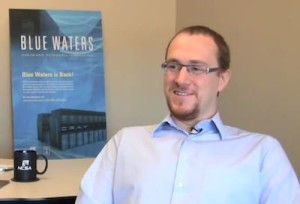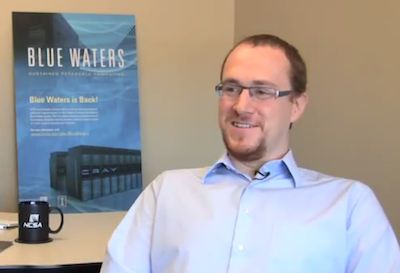 In this video from the Switzerland HPC Conference, Torsten Hoefler from ETH Zurich presents: dCUDA – Distributed GPU Computing with Hardware Overlap.
In this video from the Switzerland HPC Conference, Torsten Hoefler from ETH Zurich presents: dCUDA – Distributed GPU Computing with Hardware Overlap.
“Over the last decade, CUDA and the underlying GPU hardware architecture have continuously gained popularity in various high-performance computing application domains such as climate modeling, computational chemistry, or machine learning. Despite this popularity, we lack a single coherent programming model for GPU clusters. We therefore introduce the dCUDA programming model, which implements device-side remote memory access with target notification. To hide instruction pipeline latencies, CUDA programs over-decompose the problem and over-subscribe the device by running many more threads than there are hardware execution units. Whenever a thread stalls, the hardware scheduler immediately proceeds with the execution of another thread ready for execution. This latency-hiding technique is key to make best use of the available hardware resources. With dCUDA, we apply latency hiding at cluster scale to automatically overlap computation and communication. Our benchmarks demonstrate perfect overlap for memory bandwidth-bound tasks and good overlap for compute-bound tasks.”
Torsten Hoefler is an Assistant Professor of Computer Science at ETH Zürich, Switzerland. Before joining ETH, he led the performance modeling and simulation efforts of parallel petascale applications for the NSF- funded Blue Waters project at NCSA/UIUC. He is also a key member of the Message Passing Interface (MPI) Forum where he chairs the “Collective Operations and Topologies” working group. Torsten won best paper awards at the ACM/IEEE Supercomputing Conference SC10, SC13, SC14, EuroMPI’13, HPDC’15, HPDC’16, IPDPS’15, and other conferences. He published numerous peer-reviewed scientific conference and journal articles and authored chapters of the MPI-2.2 and MPI-3.0 standards. He received the Latsis prize of ETH Zurich as well as an ERC starting grant in 2015. His research interests revolve around the central topic of “Performance-centric System Design” and include scalable networks, parallel programming techniques, and performance modeling.
See more talks in the Switzerland HPC Conference Video Gallery




